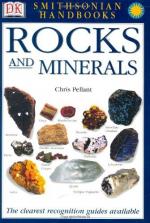|
This section contains 1,166 words (approx. 4 pages at 300 words per page) |

|
The term mineral is often used to denote any material that occurs naturally in the ground, including oil and natural gas. However, mineralogists and geologists restrict its use to naturally occurring solids having specific chemical compositions. For example, all solid forms of pure silica (SiO2) are minerals, including natural glass and quartz, but coal is not a mineral because it has no definite and universal chemical composition.
Solids produced by living things—bones, shells, pearls, and the like—are a special case. Scientists usually consider these objects non-minerals even when they have definite a chemical composition, as do the calcium carbonate (CaCO3) shells of marine animals. The distinction is more professional than physical; mineralogists study minerals, but biologists study shells and bones, so shells and bones must not be minerals. However, biological solids that have been completely rearranged at the atomic level are officially regarded as minerals. For...
|
This section contains 1,166 words (approx. 4 pages at 300 words per page) |

|


